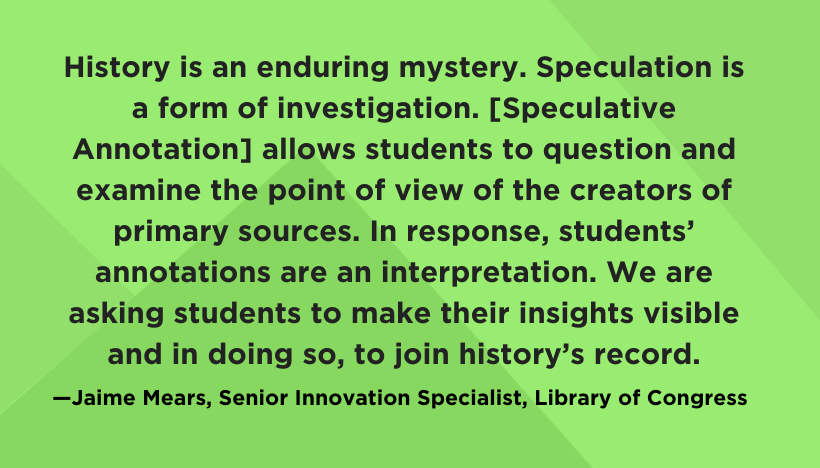This blog post was written by NCTE member Remi Kalir.
“I want my students to move beyond passive reading and begin engaging in critical conversation with a text.”
—Participant in the NCTE 2021 Summer Sandbox
Our students are well-versed in the everyday literacy practice of annotation. Readers—as writers—add sticky notes to novels, write marginalia in textbooks (whether we want them to or not), and compose commentary with digital media when reading online. Learners’ handwritten and digital mark-making is a means by which they elicit observations and questions, identify confusion, and spark collaborative dialogue. Whether with poetry or primary sources, annotation is an interactive approach to reader response that helps learners to make meaning of their texts, contexts, and curiosities. Annotation makes thinking visible.
This past summer, NCTE supported educators in making their thoughts about annotation, literacy, and learning both visible and actionable. The four-part 2021 Summer Sandbox Series “Annotation Makes Thinking Visible” invited educators to explore the historic, creative, civic, and disciplinary qualities of annotation. Nearly 600 educators registered to join us for at least one Sandbox session.
The Sandbox Series extended a partnership between NCTE and the Library of Congress by guiding educators’ engagement with the Library of Congress Labs’ Speculative Annotation project and technology. Created by Library of Congress Innovator-in-Residence Courtney McClellan, Speculative Annotation places students in “direct conversation” with primary sources through annotation, shares curators’ annotated items and other educational resources, and provides a free, hands-on opportunity for learners of all ages to experience the playful and powerful qualities of annotation.
During the Summer Sandbox, a participating educator asked: “Why is it called ‘speculative’ annotation?” In response, sandbox cofacilitator Jaime Mears, Senior Innovation Specialist at the Library of Congress Labs, noted: “History is an enduring mystery. Speculation is a form of investigation. [Speculative Annotation] allows students to question and examine the point of view of the creators of primary sources. In response, students’ annotations are an interpretation. We are asking students to make their insights visible and in doing so, to join history’s record.”
Each Sandbox session demonstrated how Speculative Annotation—as both a tool and a creative approach to mark-making—can support students’ meaningful interaction with historical artifacts and narratives. The first session featured Stephanie Stillo, curator of the Lessing J. Rosenwald Collection in the Rare Book and Special Collections Division of the Library of Congress, who shared her annotation of “Ars Memorandi” (the “Art of Memory”), a 15th-century book that helped readers to remember Biblical scripture. In her presentation, Stephanie remarked that annotation is about “making a book what it should be”—she also discussed exorcism and censorship, and observed that “early-modern folks were excellent annotators.”

Library of Congress Curator Stephanie Stillo’s annotation of “Ars Memorandi” using speculative annotation
The sandbox’s second session featured Courtney’s commentary about creative expression. She focused on monuments, as well as themes of remembrance, protest, and counternarrative, so as to examine Maya Lin’s proposal for the Vietnam Veterans Memorial. Our third session’s focus on civic annotation was guided by Jen Reidel, a social studies teacher and a former Civics Teacher in Residence for the Library of Congress. Jen discussed Patsy Mink’s handwritten notes for a 1960 speech about civil rights, concluding that “the act of civic engagement itself is a form of annotating one’s own story into that of the American narrative, of which there are many.” Our sandbox session concluded with guests Karen Linn Femia, a senior archives specialist in the Manuscript Division of the Library of Congress, and Josh Levy, the historian of science and technology at the Manuscript Division. Karen and Josh encouraged participants to appreciate “historical weirdness” and “moments of strangeness”—as with an artifact from the Finn Ronne Antarctic Expedition in the 1930s—that can reveal complex narratives about scientific exploration, literature, gender, and place.
Recordings of the four Summer Sandbox presentations are available to view online. Project updates, as well as annotated items, are being shared via social media using #AnnotateLoC. Use of the Speculative Annotation website is free, and you and your students can begin annotating items anytime. This educator guide is a useful starting point that addresses how Speculative Annotation can be used in your classroom. Moreover, if you are interested in ongoing professional learning about Speculative Annotation and classroom annotation practices, please complete the form at the bottom of the sandbox website. These professional learning opportunities will be organized in coordination with sandbox cofacilitator Antero Garcia of Stanford University.
During the final session of our sandbox we asked educators: “Why is annotation important for your students’ literacy education?” We heard that annotation slows down the process of reading so learners can “notice what might escape us” and that annotation contributes to deep understanding. With annotation, one participant noted, students “are able to discuss online and have conversations with [the] text, themselves, and each other.” Another educator mentioned how annotation enables students to have a “personal conversation” with texts, emphasizing: “What do they have to add to the dialogue?”
Educators’ wisdom about the value of annotation echoes research indicating that annotation aids students’ reading comprehension, meaning-making, and collaborative learning. Whether with Speculative Annotation or other approaches to this everyday literacy practice, this school year is an opportune time to amplify annotation as students read and write their learning journeys.
Remi Kalir is an associate professor of Learning, Design, and Technology at the University of Colorado Denver. He is the coauthor, with Antero Garcia, of Annotation. Remi is also cofounder of the Marginal Syllabus, a professional learning initiative that uses social annotation to spark and sustain conversation about educational equity. His scholarship about annotation has appeared in the Journal of Literacy Research, English Journal, and Information and Learning Sciences, among other publications. Contact Remi or connect with him via Twitter at @remikalir.

